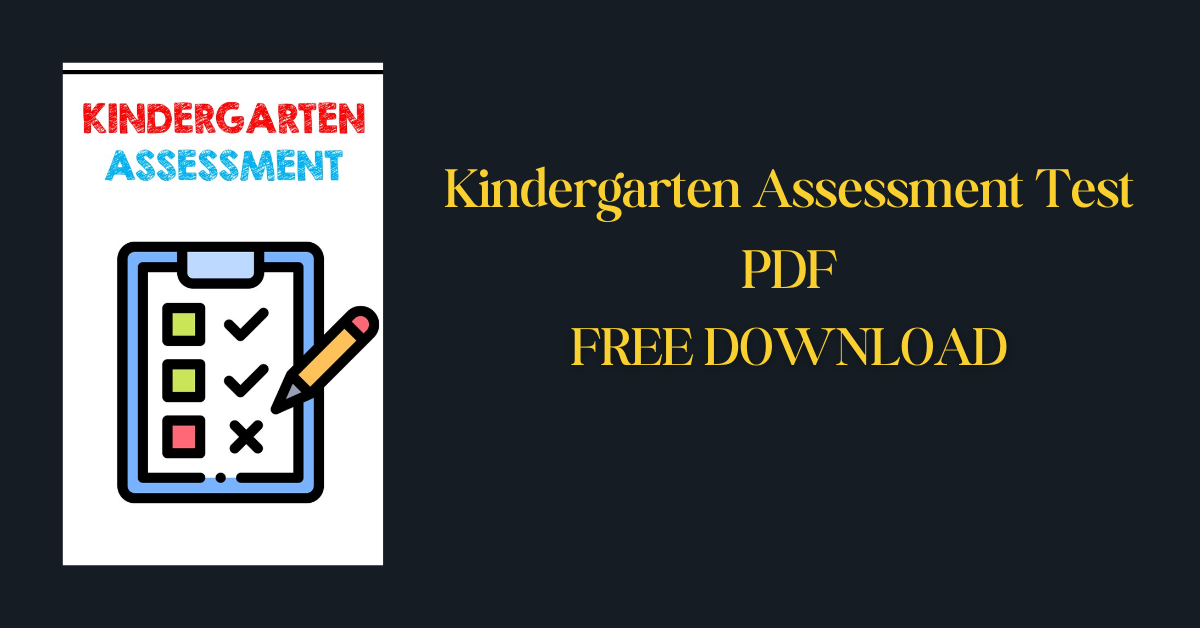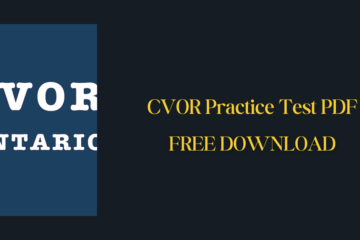Kindergarten assessment tests play a pivotal role in a child’s educational journey. They are designed to evaluate various aspects of a child’s development, from cognitive and social skills to physical and emotional well-being.
These assessments provide valuable insights into a child’s readiness for formal schooling and help educators, parents, and policymakers make informed decisions about a child’s education.
| Name of the PDF | kindergarten assessment test pdf |
| Author | Linda Ellis |
| No. of pages | 392 |
| Category | Screening test |
| Language | English |
| PDF Link | Click Here |
Also Download
What Are Kindergarten Assessment Tests
Kindergarten assessment tests are standardized tools used to evaluate a child’s readiness for formal education, specifically at the kindergarten level.
These assessments are designed to assess various aspects of a child’s development, including cognitive, social, emotional, and physical domains.
They provide educators, parents, and educational institutions with valuable information about a child’s strengths, weaknesses, and overall preparedness for kindergarten.
Kindergarten assessment tests serve as a snapshot of a child’s abilities and developmental milestones at the beginning of their educational journey. They are typically administered before or during the early weeks of kindergarten, allowing educators to tailor instruction and support to each child’s unique needs.
These assessments are an essential part of early childhood education, as they help identify any learning delays, disabilities, or areas where additional support may be required.
Types of Kindergarten Assessment Tests
There are several types of kindergarten assessment tests, each serving a specific purpose in evaluating different aspects of a child’s development:
Screening Tests: Screening tests are broad assessments that aim to identify children who may be at risk of developmental delays or learning difficulties. They are typically administered to all kindergarten students and help educators identify those who may need further evaluation.
Diagnostic Tests: Diagnostic tests are more in-depth assessments used to pinpoint specific areas of strength and weakness in a child’s cognitive or academic skills. They provide detailed information that can guide intervention strategies and individualized learning plans.
Developmental Assessments: Developmental assessments focus on evaluating a child’s overall growth and development across various domains, including language, motor skills, social and emotional development, and cognitive abilities. They provide a comprehensive view of a child’s readiness for kindergarten.
Why Kindergarten Assessment Tests Matter
Kindergarten assessment tests hold significant importance for several reasons:
- Early Intervention: These assessments enable early identification of any learning disabilities or developmental delays, allowing for timely intervention and support. Early intervention is crucial in addressing potential challenges and ensuring children receive the help they need to succeed.
- Personalized Learning: The data from these tests can inform educators about a child’s strengths and weaknesses, enabling them to tailor instruction and curriculum to meet individual needs. This personalized approach promotes better learning outcomes.
- School Placement: Kindergarten assessment results may influence school placement decisions, helping ensure that children are placed in classrooms or programs that best suit their abilities and developmental stage.
- Research and Data: Aggregate data from kindergarten assessments can inform educational research, policy decisions, and curriculum development, contributing to continuous improvement in early education programs.
The Components of a Kindergarten Assessment Test
Cognitive Skills Assessment
- Language and Literacy: This component assesses a child’s language skills, including vocabulary, comprehension, and early reading abilities. It evaluates whether a child can recognize letters, identify sounds, and understand basic reading concepts.
- Math Readiness: Math readiness assessments evaluate a child’s foundational math skills. This may include counting, number recognition, basic addition and subtraction concepts, and an understanding of shapes and patterns.
- Executive Functioning: Executive functioning skills assess a child’s ability to manage tasks, focus attention, and demonstrate self-control. This component may include tasks that evaluate working memory, problem-solving, and impulse control.
Social and Emotional Development Assessment
Social and emotional development assessments focus on a child’s ability to interact with peers and adults, regulate emotions, and demonstrate age-appropriate social behaviors. This component may include observations of a child’s ability to share, take turns, express feelings, and engage in cooperative play.
Fine and Gross Motor Skills Assessment
- Fine Motor Skills: Fine motor skills assessments evaluate a child’s coordination and dexterity, such as their ability to hold a pencil, cut with scissors, and manipulate small objects. These skills are essential for tasks like writing and drawing.
- Gross Motor Skills: Gross motor skills assessments focus on a child’s physical coordination and large muscle movements. This may include activities like running, jumping, balancing, and catching or throwing a ball.
Behavioral Observation
Behavioral observations are an integral part of kindergarten assessments. Educators and assessors observe a child’s behavior during testing and in various classroom settings to assess factors like attention, engagement, and behavior management. This provides valuable insights into a child’s behavior in a school environment.
Health and Well-being Evaluation
Some assessments include a health and well-being component, where a child’s overall health, nutrition, and physical well-being are assessed. This may include questions about a child’s medical history, immunizations, and general health status.
Preparing Your Child for a Kindergarten Assessment Test
Preparing your child for a kindergarten assessment test is essential to ensure they have a positive and successful experience. While it’s important to remember that these assessments are not meant to be “pass or fail” tests, but rather tools for understanding your child’s development, there are several ways you can support your child’s readiness:
Supporting Cognitive Development at Home
- Read Together: Encourage a love of reading by reading books together regularly. This helps improve language skills and fosters a love of learning.
- Play Educational Games: Engage in educational games and activities that promote early math and literacy skills. Puzzles, counting games, and alphabet games can be both fun and educational.
- Encourage Curiosity: Foster your child’s natural curiosity by answering their questions and encouraging them to explore their interests.
- Provide a Rich Learning Environment: Create a home environment with a variety of educational materials, such as books, art supplies, and educational toys.
Encouraging Social and Emotional Skills
- Social Interaction: Arrange playdates and social interactions with peers to help your child develop social skills like sharing, taking turns, and making friends.
- Teach Emotion Regulation: Help your child understand and manage their emotions by talking about feelings and teaching coping strategies.
- Set Routine and Structure: Establish a consistent daily routine to provide a sense of security and predictability, which can promote emotional stability.
Promoting Physical Development
- Outdoor Play: Encourage physical activity through outdoor play, such as running, jumping, and playing on swings or climbing equipment.
- Fine Motor Activities: Provide opportunities for fine motor skill development through activities like coloring, cutting, and playing with building blocks.
- Healthy Habits: Ensure your child gets enough rest, eats a balanced diet, and practices good hygiene, as physical well-being contributes to overall readiness.
Preparing Emotionally for the Assessment
- Be Supportive: Maintain a positive and supportive attitude throughout the assessment process, reassuring your child that it’s okay to feel nervous or uncertain.
- Familiarize with the Testing Environment: If possible, visit the school or assessment location with your child beforehand so they can become familiar with the surroundings.
- Talk About the Assessment: Explain in simple terms what the assessment will entail, emphasizing that it’s an opportunity to show what they know and can do.
- Manage Test Anxiety: Teach your child relaxation techniques, such as deep breathing, and provide a comforting item or a special snack for afterward.
Conclusion
Kindergarten assessment tests play a crucial role in shaping a child’s educational journey, providing valuable insights into their readiness for formal schooling.
These assessments are not meant to be intimidating or stressful experiences for children; rather, they are tools designed to support their growth and development.
By assessing cognitive, social, emotional, and physical skills, kindergarten assessments offer a holistic view of a child’s readiness for kindergarten, helping educators tailor instruction and support to meet individual needs.
FAQs
What is a kindergarten assessment test?
A kindergarten assessment test is a standardized evaluation tool used to assess a child’s readiness for formal education at the kindergarten level. It measures various aspects of a child’s development, including cognitive, social, emotional, and physical skills.
Why are kindergarten assessment tests important?
Kindergarten assessment tests are important because they help educators, parents, and educational institutions understand a child’s strengths and weaknesses, identify developmental delays or learning disabilities, and tailor instruction to meet individual needs. They also contribute to data collection and policy decisions in early education.
What are the components of a kindergarten assessment test?
Kindergarten assessment tests typically include components such as cognitive skills assessment (language and literacy, math readiness, and executive functioning), social and emotional development assessment, fine and gross motor skills assessment, behavioral observation, and sometimes a health and well-being evaluation.
Who administers kindergarten assessment tests?
These tests can be administered by school personnel, including teachers and specialists, as well as by outside agencies or professionals with expertise in early childhood development.
Are kindergarten assessment tests standardized?
Yes, kindergarten assessment tests are typically standardized to ensure consistency and fairness in the assessment process. Standardization means that the test is administered and scored in a consistent manner to provide reliable results.
Can parents prepare their child for a kindergarten assessment test?
Parents can help prepare their child by providing a supportive learning environment, engaging in educational activities at home, promoting social and emotional development, and ensuring their child’s physical well-being. However, it’s important to strike a balance and avoid excessive test preparation, as these assessments are meant to reflect a child’s natural abilities.
What happens if a child doesn’t perform well on a kindergarten assessment test?
Low performance on a kindergarten assessment test does not indicate failure. Instead, it may highlight areas where a child may benefit from additional support or intervention. Schools and educators use these results to create personalized learning plans to address specific needs.
Are there alternatives to traditional kindergarten assessment tests?
Some schools and educational systems use alternative methods, such as teacher observations, portfolio assessments, or play-based assessments, to evaluate a child’s readiness for kindergarten. These alternatives may provide a more holistic view of a child’s abilities and development.
Is there a national standardized kindergarten assessment test in the United States?
The United States does not have a single national standardized kindergarten assessment test. Kindergarten assessments vary by state and school district, with some states implementing their own assessment tools to align with local curriculum and educational standards.
How can parents and educators collaborate to support a child’s development and assessment?
Collaboration between parents and educators is essential. Regular communication, sharing assessment results, and working together to create a supportive and enriching learning environment can significantly benefit a child’s development and educational experience.

Niketa Mulay, a seasoned content writer and editor, has over a decade of experience. With a Master’s in Journalism, she honed her skills at The Times of India and now freelances across various industries. Passionate about reading, writing, and scuba diving, she shares expert PDF guides and tips at PDFdrivehub.com.




